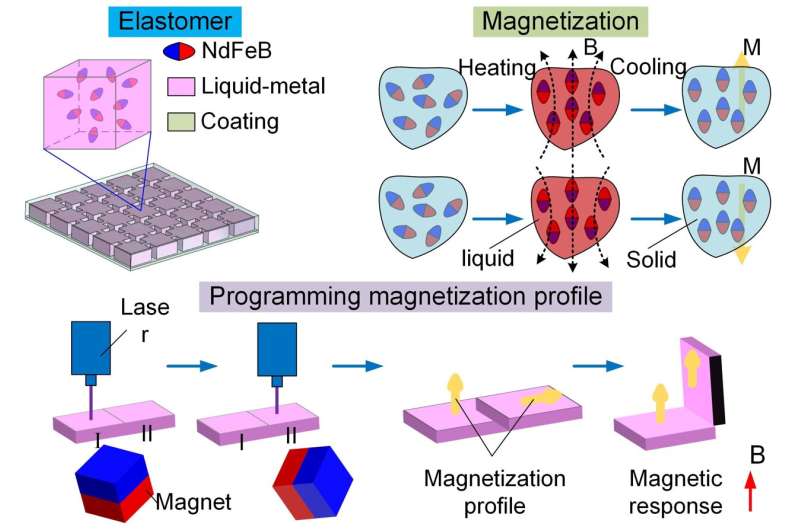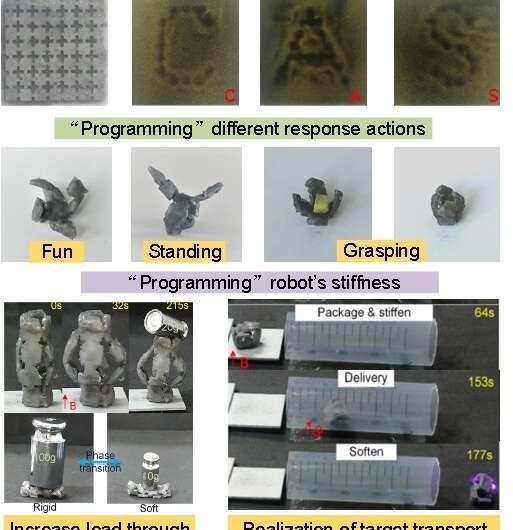Credit: Zhao et al.
Magnetic soft robots are systems that can change shape or perform different actions when a magnetic field is applied to them. These robots have numerous advantageous characteristics, including a wireless drive, high flexibility and infinite endurance.
In the future, micro-scale magnetic soft robots could be implemented in a variety of settings; for instance, helping humans to monitor the environment or to remotely perform biomedical procedures. Most of the systems developed so far, however, can only complete simple tasks and take on a limited number of shapes.
Researchers at the Chinese Academy of Sciences have recently devised a new technique for creating shape-programmable magnetic soft robots. This technique, outlined in a paper pre-published on arXiv and presented at the CCIR2021 conference, allowed them to create a new robot based on magnetic pixels that can change shapes and complete a variety of actions or tasks.
"Whether they are based on soft or hard magnetic materials, the magnetization process of most soft robots is coupled with its manufacturing process," Ran Zhao, one of the researchers who carried out the study, told Techxplore. "In other words, the robots cannot realize the reconfiguration of functions through programs like traditional robots with control units. This means that magnetic soft robots have a long way to go before they can be applied in real-world settings."
The new approach introduced by Zhao and his colleagues enables the creation of magnetic soft robots that can be programmed repeatedly. The key principle behind this approach is to wrap the magnetic particles used to fabricate the robots in phase transition materials.
"By changing the temperature, we can repeatedly 'write' and 'erase' magnetization profiles as needed," Zhao explained. "Using our approach, we manufactured a reprogrammable magnetic soft robot. By changing the magnetization profile in the elastomer, the robot can produce different response actions."
Credit: Zhao et al.
The robot created by Zhao and his colleagues is made up of magnetic pixels, particles containing a liquid metal and a neodymium magnet (NdFeB), as well as an elastic matrix made of silicon. The researchers magnetized each of the magnetic pixels individually, using a process known as laser-assisted heating.
"The response actions and functions of our soft robot can be reconfigured by programming," Zhao said. "We can use a single pixel or multiple pixels as an independent magnetization profile; thus, the scale of our robot can span across a large range. By adding flexure hinges between magnetic pixels, we make the soft robot have a unique hardening function."
The robot created by the researchers can maintained a fixed shape, simply by switching to its 'rigid body' mode. In addition, both its magnetization and stiffness can be easily programmed.
"The technique we created allows our magnetic soft robot to reconfigure its functions and switch freely between soft form and rigid form, so as to meet the needs of different tasks," Zhao said. The magnetic soft robot has a certain 'intelligence," thus the range of tasks it can execute has been greatly increased."
In the future, the magnetic coding technique could be used to create soft magnetic robots. Zhao and his colleagues have already demonstrated its potential by using it to create several magnetic soft robots based on an origami structure.
Their work highlights the feasibility of manufacturing magnetic, re-usable and soft robots on a large scale. These robots could be particularly useful for environmental monitoring, drug transport and in vivo sampling applications.
"As a next step, we will further reduce the size of the robot and try to design a 3D structure," Zhao added. "We believe that the development of universal technology will help to make the micro magnetic soft robot from laboratory to commercial application as soon as possible."
More information: Ran Zhao, Hanchen Yao, Houde Dai, Shape programmable magnetic pixel soft robot. arXiv:2111.00422v2 [cs.RO], arxiv.org/abs/2111.00422
© 2021 Science X Network

























